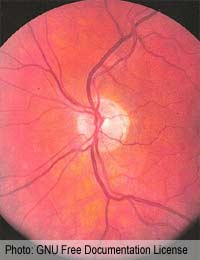Retinal Vein Occlusion

Retinal Vein Occlusion
Retinal vein occlusion occurs when the tiny veins directing the blood supply away from the eye become blocked. This can cause the blood to build up and eventually the increase in pressure causes leaking into the tissues affecting vision.Why Do The Veins Become Blocked?
As this condition affects parts of the vascular system, any disorders that can block veins may cause this problem. Smoking, consuming a diet rich in fats, high blood pressure and obesity can all be contributory factors. Smoking and fats can cause a build-up of plaques or cause the blood to become thickened which may lead to the vein becoming occluded by either the plaque or a blood clot. The vein walls may become hardened also making it difficult for the blood to be drained away. This can also be caused by smoking, fats and high blood pressure.Signs And Symptoms
The symptoms associated with this condition vary depending on which veins are affected by occlusion. If a blood vessel becomes blocked, blood will built up behind the blockage and also caused oxygen levels to certain parts of the anatomy to become depleted.Blockages in these vessels can happen very quickly due to their very narrow diameter and vision can be altered fairly rapidly. Blurring, loss of vision or patchiness of images may present sometimes quite severely.If sudden loss of vision has occurred the person must seek medical help immediately to achieve an accurate diagnosis of the problem.Treatment For Retinal Vein Occlusion
During diagnosis of retinal vein occlusion, consideration should be given as to why the occlusion has occurred. It is likely that there is an underlying condition that will need diagnosing and treating, with the possible effect of saving life. Undiagnosed hypertension (high blood pressure), vascular disease, heart disease and diabetes can all be life threatening and will need treating to prevent other, possibly more serious blockages in major veins and arteries from occurring. Lifestyle changes and medication can prevent the blood from thickening, though blood test will need to be performed regularly to assess the coagulation levels of the blood.Current treatments for retinal vein occlusion include the use of laser therapy which involves using a very powerful but precise beam of light sent directly onto the required area. Massaging the eye may help, but this should only be done by a professional who will have been trained on how to do this. There is currently a great deal of research being carried out in the field of retinal vein occlusion treatment and new drugs are being developed and tested.The person will have to adopt a healthier lifestyle in order to prevent other blockages from occurring.
Retinal vein occlusion can be a serious condition and an indicator of some potentially life threatening diseases. It can occur in anyone of any age and treatment options will depend on the cause of the blockage. Often the blockage itself cannot be treated directly, but further occlusions can be prevented by making various changes in lifestyle and by having underlying illnesses diagnosed and treated early and effectively.
- Rosacea in the Eye
- Is a Vitreous Haemorrhage Serious?
- My Mum Has Macular Degeneration
- What is Vitrectomy Surgery?
- Why Do Eyelids Twitch?
- What is Graves' Ophthalmology?
- Retinitis Pigmentosa
- Corneal Disease
- Corneal Ulcers
- Nystagmus
- Flashes and Floaters
- Keratoconus
- Double Vision
- Eye Infections
- What Causes Dry Eye?
- Diabetes and Eyes
- Hay Fever and Allergies


Re: Contact Lens Trials Explained
Hi, I just visited eyehelp.co.uk and wondered if you'd ever thought about having an engaging video to explain what you…
Re: Is There an Operation for 'Lazy Eye'?
written on the parchment was scratched out
Re: What is Vitrectomy Surgery?
I had vitrectomy 4 weeks ago. The surgery was not well done as apparently bleeding occurred. The hole did not close despite having…
Re: Glasses or Contacts?
I need a eye exam and new glasses it's been since 2013/ I have no income I lost my boyfriend last September and I've been homeless ever…
Re: Eyewear for the Partially Sighted
This extract from your text is not clear and the grammar is poor- and the letters in the validation box are mixed…
Re: Eye Cancer Symptoms
I have yellow in both eyes lools like 2 dots. But looks like its makin the white part of my eye yellow whats wrong with me
Re: Are my Glasses Affecting my Eyes?
Hi, Please can anyone give advice on wearing varifocals. After a short while I develop a severe ache in my left eye and…
Re: Are my Glasses Affecting my Eyes?
On wearing my new varifocals, I am finding that my left eyeball hurts so much it feels like it will explode after 15…
Re: What is the Cause of my Itchy Eye?
I have One and only One itchy eye that has been going on 24/7 for 5 weeks.Eye is not swollen vision not affected. Eye doc…
Re: Contact Lens Trials Explained
Hi, We wanted to get in touch with you to increase traffic on your website. Please reply to this email so we can send you free…